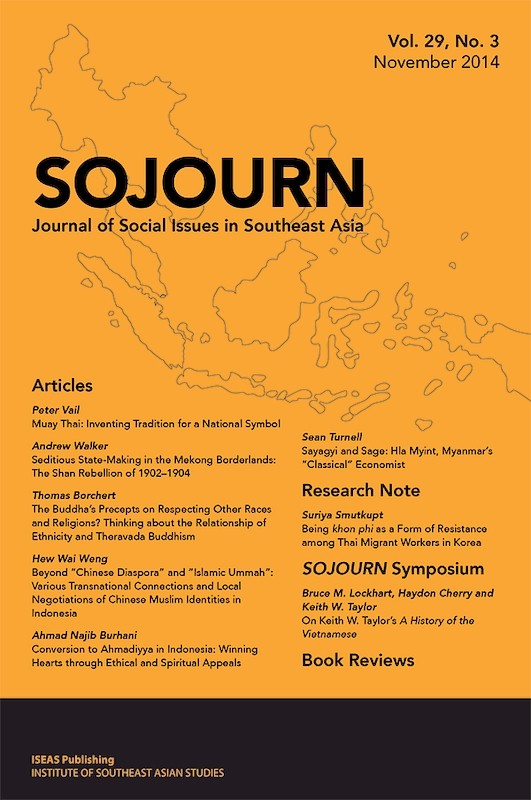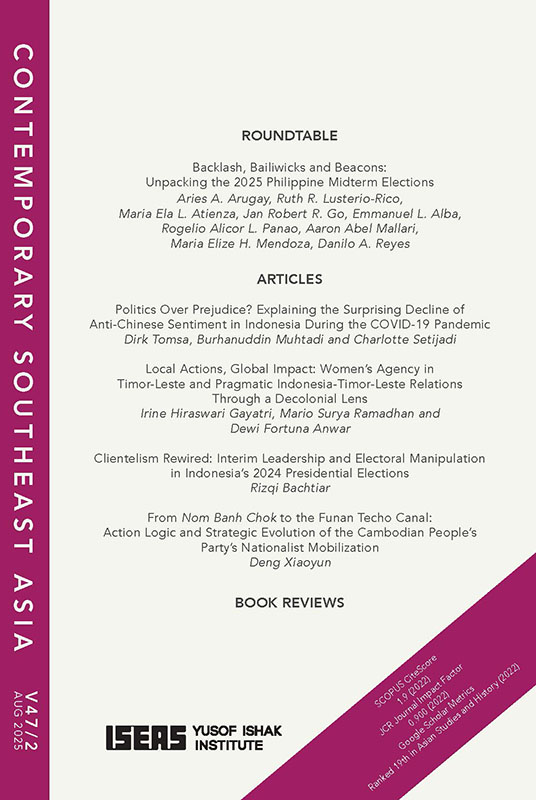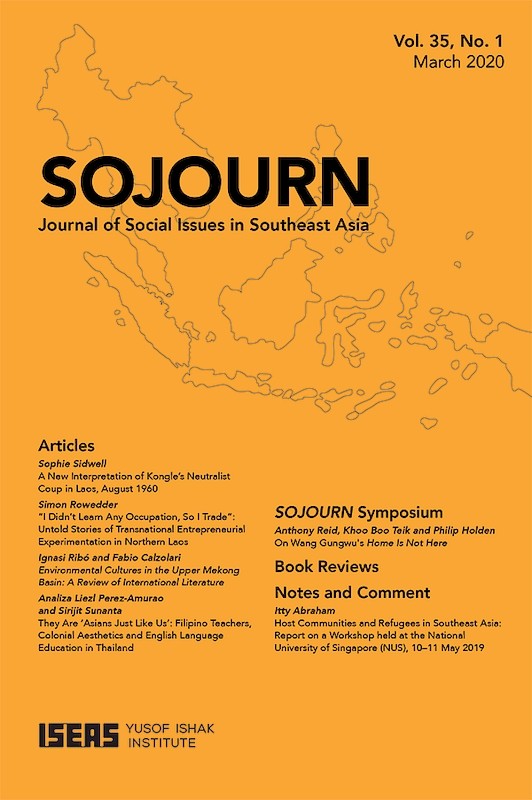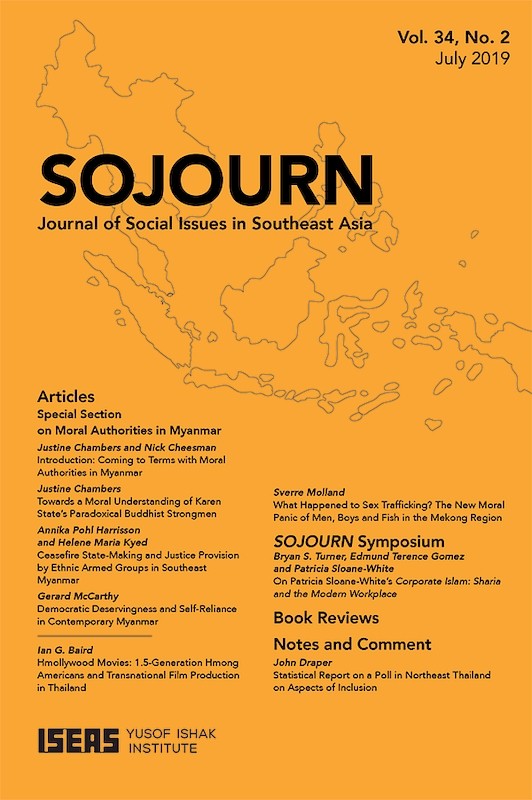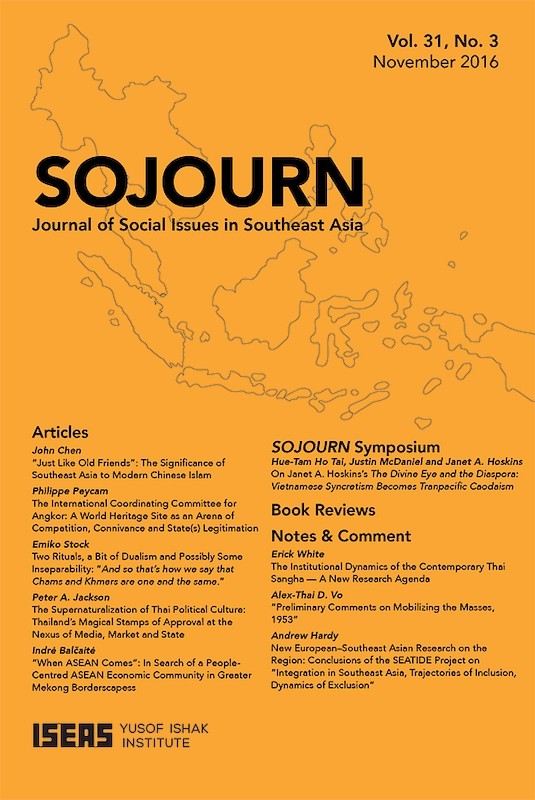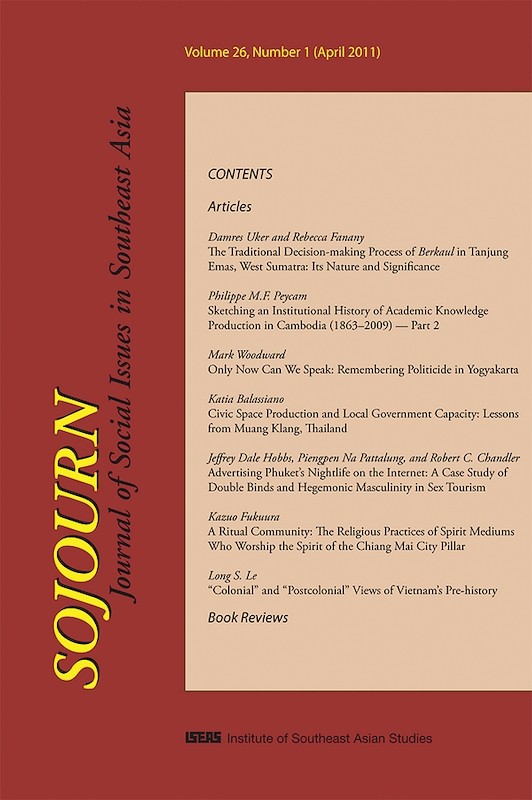SOJOURN: Journal of Social Issues in Southeast Asia Vol. 29/1 (March 2014)
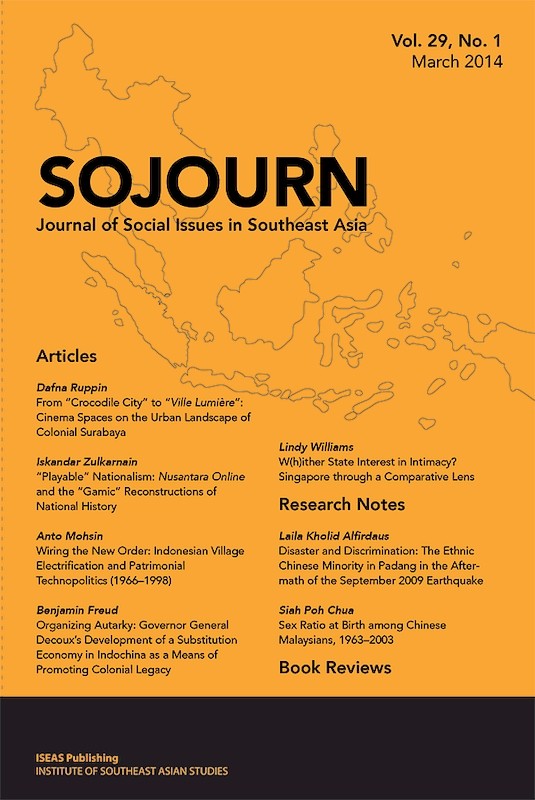
Date of publication:
March 2014
Publisher:
Institute of Southeast Asian Studies
Number of pages:
221
Code:
SJ29/1
Contents
-
SOJOURN: Journal of Social Issues in Southeast Asia Vol. 29/1 (March 2014)
[Whole Publication, ISSN: 17932858] -
Preliminary pages
- ARTICLES
-
From "Crocodile City" to "Ville Lumière": Cinema Spaces on the Urban Landscape of Colonial Surabaya , by Dafna Ruppin, author see abstractThe development of exhibition spaces in Surabaya, from canvas and bamboo tents to luxurious cinema palaces, between 1897 and World War I demonstrates the burgeoning movie-going scene in this major colonial-era port city in Eastern Java. The evolution of these venues on the modernizing urban landscape came in the context of other processes of development and social change, which informed both the decisions of cinema entrepreneurs and the mobility of spectators. As a<br>site in which technology, race and colonialism converged, the cinema represented a liminal space in Surabaya’s multiethnic and increasingly polarized colonial society.
-
"Playable" Nationalism: Nusantara Online and the "Gamic" Reconstructions of National History, by Iskandar Zulkarnain, author see abstract<div align="left">Nusantara Online is an Indonesian-made massively multiplayer online role-playing game that imaginatively reconstructs the history of the archipelago. As an “allegorithm” for the Indonesian nation, the game suggests a distinct model of digital nationalism, here dubbed “playable” nationalism. This concept captures the formulation of “Nusantara” as the idealized yet playful version of the Indonesian archipelago, a version emphasizing the principles of digital collaboration. The promotion of this model of “digital nationalism” as an egalitarian model of Indonesian popular nationalism has certain limitations.</div>
-
Wiring the New Order: Indonesian Village Electrification and Patrimonial Technopolitics (1966-1998), by Anto Mohsin, author see abstractWhile Indonesia’s New Order government frequently claimed that its motivation for rural electrification was the improvement of villagers’ welfare, the motivation was also political. It sought to convince villagers to vote for GOLKAR in the general elections. In addition, President Soeharto used electrification inauguration ceremonies to create a sense of Indonesia as a rapidly developing society with himself at the helm directing the country’s development. As a result, his political support in the countryside increased, a factor that helped him stay in power for thirty-two years. Although the State Electricity Company disliked the New Order’s patrimonial technopolitics, it continued to electrify the nation, as it was convinced of the socio-economic benefits of village electrification.
-
Organizing Autarky: Governor General Decoux's Development of a Substitution Economy in Indochina as a Means of Promoting Colonial Legitimacy, by Benjamin Vining, author see abstractCut off from the metropole and coerced into trade with Japan, the French administration in Indochina under Governor General Jean Decoux had to find ingenious ways to produce locally what it had been accustomed to importing. Through the creation of a substitution economy, the nurturing of the artisanat, and appeals to Indochinese solidarity, Decoux designed policies to minimize the impact of Indochina’s isolation and exalt the benefits of French tutelage, as part of a final effort to convince the peoples of Indochina that French civilization could drive their societies forward — an approach founded on linearity that in itself reveals much about the colonial mind.
-
W(h)ither State Interest in Intimacy? Singapore through a Comparative Lens, by Lindy Williams, author see abstractNational governments have long taken widely varying positions on population policy. Singapore, for example, has made great efforts to manage individual reproductive decisions, first to lower fertility rates and then to increase them. Comparisons between Singapore’s population policies and those of two neighbouring countries, Thailand and Indonesia, reveal one case in which fertility fell dramatically despite a less intrusive policy environment, and another in which fertility also<br>fell, but not as dramatically, despite a similarly aggressive approach to Singapore’s. Of the three, Singapore’s population policy continues to be the most tenacious; it continues to be framed in terms of “national development” and economic well-being.
- RESEARCH NOTES
-
Disaster and Discrimination: The Ethnic Chinese Minority in Padang in the Aftermath of the September 2009 Earthquake, by Laila Kholid Alfirdaus, author see abstractDebates over the issue of discrimination against ethnic Chinese in Padang, West Sumatra, in the aftermath of the September 2009 earthquake centre on the reality of such discrimination. On the one hand, many ethnic Chinese in the city acknowledge that they felt discriminated against. This feeling arose from the very slow and limited response to their own and their family’s needs during the emergency situation and recovery process. On the other hand, the pribumi residents and the authorities insist that there was no discrimination. They argue that ethnic Chinese are guilty of exaggeration. In-depth interviews undertaken during June–September and a survey of the news media suggest a need to consider the social complexities surrounding disaster management and recovery.
-
Sex Ratio at Birth among Chinese Malaysians, 1963-2003, by Siah Poh Chua, author see abstractThe preference for a son over a daughter is a product of traditional agrarian society that persists today. The high sex ratio at birth in China and Taiwan shows the close connection between Chinese culture and the preference for a son. It raises the question of whether there is a high sex ratio at birth (SRB) among Chinese Malaysians. Data for SRBs among Chinese in West Malaysia from 1963 to 2003, as obtained from the Department of Statistics, Malaysia, are analysed. The results<br>reveal a rising trend in SRB. SRB has been positively correlated with GDP per capita but negatively correlated with the number of babies born. The results indicate that the younger generation may also be influenced by the cultural preference for sons. Pre- and postnatal discrimination may worsen, as both growth in per capita GDP and falling birth rates are projected in the future.
- BOOK REVIEWS
-
BOOK REVIEW: The Perfect Business? Anti-Trafficking and the Sex Trade along the Mekong by Sverre Molland, by Nicolas Lainez, author
-
BOOK REVIEW: Demographic Change in Southeast Asia: Recent Histories and Future Directions edited by Lindy Williams and Michael Philip, by Elma P Laguna, author
-
BOOK REVIEW: Islam, Nationalism and Democracy: A Political Biography of Mohammad Natsir by Audrey Kahin, by M C Ricklefs, author
-
BOOK REVIEW: Global Indonesia by Jean Gelman Taylor, by Anthony Reid, author
-
BOOK REVIEW: Power, Change and Gender Relations in Rural Java: A Tale of Two Villages by Ann R. Tickamyer and Siti Kusujiarti, by Jan Newberry, author
-
BOOK REVIEW: Mediums, Monks and Amulets: Thai Popular Buddhism Today by Pattana Kitiarsa, by Thomas Borchert, author
-
BOOK REVIEW: Social Science and Knowledge in a Globalising World edited by Zawawi Ibrahim, by Johan Saravanamuttu, author

